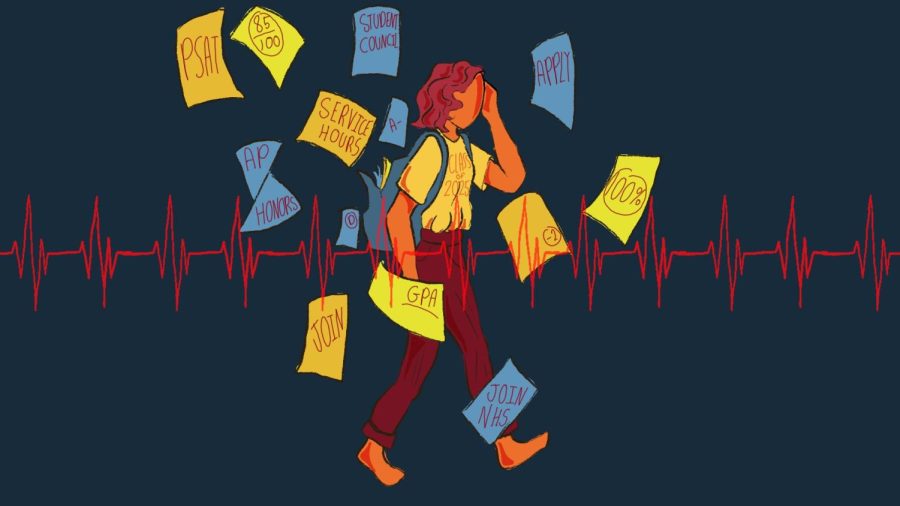High school should be more than just preparation for college
Staff writer Kate Michel writes that pressure to succeed can be harmful to high schoolers.
June 22, 2022
When a freshman begins their first year of high school, one of the first things they may notice is Algonquin’s wide variety of clubs, offering opportunities to bond with peers, find new passions and help out the community. However, when someone joins a club, it is almost inevitable that they will hear the other motive for getting involved: “It looks good on a college application.”
What starts as a lighthearted joke can quickly become a sobering reality. One of the biggest reasons high schoolers choose to join so many extracurriculars, filling their schedules to a point of overwhelming stress, is a desperate attempt to stand out in a sea of other applications. This is by no means an issue for all students at Algonquin, although it is all too common. Plenty of people choose to prioritize balancing their schedule over taking on unnecessary responsibilities, but it’s often those who bite off more than they can chew who are considered the most dedicated. This so-called dedication may seem harmless or even admirable at first, but when it takes a real toll on the mental health of a great number of teenagers.
According to a survey conducted by the CDC in 2019, more than 1 in 3 high school students had experienced sadness or hopelessness in the 12 months preceding the survey. This is a 40 percent increase since 2009, and the COVID-19 pandemic further negatively affected teenagers’ mental health. The same survey also reported that 1 in 6 high school students had planned to commit suicide in the past year, a 44 percent increase since 2009.
As high school progresses, the core classes tend to get more challenging, and when AP classes are introduced in sophomore year, the stakes are higher than ever before for certain students.
While some students don’t take these highest-level AP classes for various reasons, including choosing to direct their energy to interests they prefer, it’s easy to get caught up in the excitement of being able to take college level classes during high school. These classes are appealing not only for the challenge and rigor but also (and for many students, mostly) because they can make future college applications more competitive.
Underclassmen are constantly absorbing a mess of contradictions. Teachers assure them that the first half of high school won’t determine their entire life, but friends and parents may pressure them into taking classes such as AP U.S. History, AP U.S. Government and Politics or AP Computer Science Principles their sophomore year because colleges supposedly won’t think they’re ambitious enough if they don’t.
I remember the day that I decided to take U.S. History II at the honors level instead of AP. My friends were shocked by my choice, telling me I could definitely handle the higher level class and I would be at a disadvantage when it came time for college applications.
I had a long explanation of my choice prepared for anyone who interrogated me, but it all boiled down to one thing: I didn’t like history, so why should I spend weeks studying for a final exam in a college-level course that I would never pursue as a career? I was already putting an incredible amount of pressure on myself to keep my grades up, just like most of my friends. What would happen when I had to balance Chemistry and Geometry with an AP class, all while forcing myself to maintain an A in all three? The pressure to have perfect grades was already present for me in middle school, but the additional knowledge that colleges prefer perfect students makes this even more overwhelming.
For students aiming to go to college, some perceive their intelligence to be measured by whether or not they get into a “good” institution. The most common way to measure if a college is good is its acceptance rate, which is not always reliable for determining whether or not a college has high standards. Colleges with low acceptance rates often have steep prices, leaving students in crippling debt. Some students may even get caught up in the prestige of a school like Harvard, not taking into account that it might not be a good fit for them. It may feel great for about a week to get into a highly selective school, but if the “brand name” of the college is the only factor in a student’s decision to go there, their mental health could suffer, just as it did in high school for a large number of teenagers.
Even if high schoolers eventually end up at a college they love, those who spend all four years of high school agonizing over grades and packing their schedules full of unique activities miss out on the high school experience.
As summer rapidly approaches, it can be tempting to take on a schedule filled with AP classes and impressive electives. However, struggling through four years of stress in an attempt to be happier in the years to come is not an ideal trade-off. Underclassmen should remember that there is still plenty of time before they have to face the application process, and it’s okay to live in the moment and enjoy high school. Mental health is just as important as physical health, and participating in hobbies that cannot improve a college application is not a waste of time if it brings happiness. After all, high school is real life, not a four-year orientation for college.










